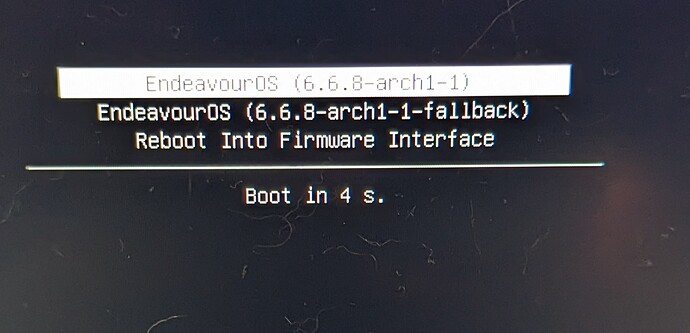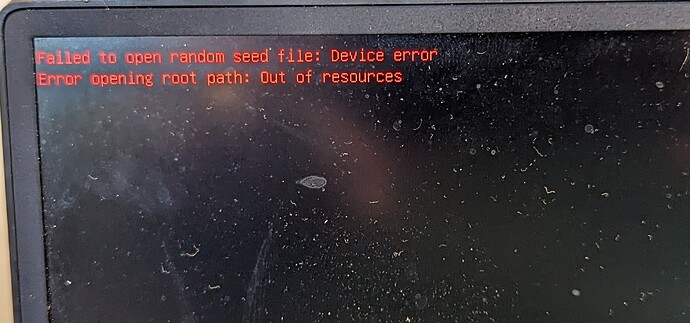I don’t think this is related to the mesa problems that others are experiencing in the past few days.
I’ve been using EOS as my daily driver for well over a year with very few problems. I usually update once a week and today (02 January 2024) is the first time an update has killed any Linux system in this way in over 15 years. This is a Linux only machine - no dual booting.
Potentially helpful information:
LUKS protected 2TB nvme ssd (purchased January 2023, only ever had EOS installed)
KDE Plasma
All system information from live session.
inxi -Fxa
System:
Host: EndeavourOS Kernel: 6.6.1-arch1-1 arch: x86_64 bits: 64 compiler: gcc
v: 13.2.1 clocksource: tsc available: acpi_pm
parameters: initrd=\arch\boot\intel-ucode.img
initrd=\arch\boot\amd-ucode.img
initrd=\arch\boot\x86_64\initramfs-linux.img archisobasedir=arch
archisolabel=EOS_202311 cow_spacesize=10G copytoram=n
module_blacklist=nvidia,nvidia_modeset,nvidia_uvm,nvidia_drm,pcspkr
nouveau.modeset=1 i915.modeset=1 radeon.modeset=1 nvme_load=yes
Desktop: KDE Plasma v: 5.27.9 tk: Qt v: 5.15.11 wm: kwin_x11 vt: 1
dm: SDDM Distro: EndeavourOS base: Arch Linux
Machine:
Type: Laptop System: Dell product: XPS 15 9570 v: N/A
serial: <superuser required> Chassis: type: 10 serial: <superuser required>
Mobo: Dell model: 02MJVY v: A00 serial: <superuser required> UEFI: Dell
v: 1.31.0 date: 03/13/2023
Battery:
ID-1: BAT0 charge: 45.1 Wh (100.0%) condition: 45.1/56.0 Wh (80.5%)
volts: 12.8 min: 11.4 model: LGC-LGC4.86 DELL 62MJV type: Li-ion serial: 84
status: full
Device-1: hidpp_battery_0 model: Logitech G305 Lightspeed Wireless Gaming
Mouse serial: 08-7e-91-52 charge: 100% (should be ignored)
rechargeable: yes status: discharging
CPU:
Info: model: Intel Core i7-8750H bits: 64 type: MT MCP arch: Coffee Lake
gen: core 8 level: v3 note: check built: 2018 process: Intel 14nm family: 6
model-id: 0x9E (158) stepping: 0xA (10) microcode: 0xF4
Topology: cpus: 1x cores: 6 tpc: 2 threads: 12 smt: enabled cache:
L1: 384 KiB desc: d-6x32 KiB; i-6x32 KiB L2: 1.5 MiB desc: 6x256 KiB
L3: 9 MiB desc: 1x9 MiB
Speed (MHz): avg: 814 high: 880 min/max: 800/4100 scaling:
driver: intel_pstate governor: powersave cores: 1: 800 2: 800 3: 800 4: 800
5: 880 6: 862 7: 800 8: 834 9: 800 10: 800 11: 800 12: 800 bogomips: 52815
Flags: avx avx2 ht lm nx pae sse sse2 sse3 sse4_1 sse4_2 ssse3 vmx
Vulnerabilities:
Type: gather_data_sampling mitigation: Microcode
Type: itlb_multihit status: KVM: VMX disabled
Type: l1tf mitigation: PTE Inversion; VMX: conditional cache flushes, SMT
vulnerable
Type: mds mitigation: Clear CPU buffers; SMT vulnerable
Type: meltdown mitigation: PTI
Type: mmio_stale_data mitigation: Clear CPU buffers; SMT vulnerable
Type: retbleed mitigation: IBRS
Type: spec_rstack_overflow status: Not affected
Type: spec_store_bypass mitigation: Speculative Store Bypass disabled via prctl
Type: spectre_v1 mitigation: usercopy/swapgs barriers and _user pointer sanitization
Type: spectre_v2 mitigation: IBRS, IBPB: conditional, STIBP: conditional,
RSB filling, PBRSB-eIBRS: Not affected
Type: srbds mitigation: Microcode
Type: tsx_async_abort status: Not affected
Graphics:
Device-1: Intel CoffeeLake-H GT2 [UHD Graphics 630] vendor: Dell
driver: i915 v: kernel arch: Gen-9.5 process: Intel 14nm built: 2016-20
ports: active: DP-1,DP-3 off: eDP-1 empty: DP-2 bus-ID: 00:02.0
chip-ID: 8086:3e9b class-ID: 0300
Device-2: NVIDIA GP107M [GeForce GTX 1050 Ti Mobile] vendor: Dell
driver: nouveau v: kernel alternate: nvidia_drm,nvidia non-free: 545.xx+
status: current (as of 2023-10; EOL~2026-12-xx) arch: Pascal code: GP10x
process: TSMC 16nm built: 2016-2021 pcie: gen: 1 speed: 2.5 GT/s lanes: 16
link-max: gen: 3 speed: 8 GT/s bus-ID: 01:00.0 chip-ID: 10de:1c8c
class-ID: 0302 temp: 33.0 C
Device-3: Microdia Integrated_Webcam_HD driver: uvcvideo type: USB
rev: 2.0 speed: 480 Mb/s lanes: 1 mode: 2.0 bus-ID: 1-12:7
chip-ID: 0c45:671d class-ID: 0e02
Display: server: X.Org v: 21.1.9 compositor: kwin_x11 driver: X:
loaded: modesetting alternate: fbdev,intel,nouveau,nv,vesa dri: iris,nouveau
gpu: i915 display-ID: :0 screens: 1
Screen-1: 0 s-res: 3000x1920 s-dpi: 96 s-size: 791x506mm (31.14x19.92")
s-diag: 939mm (36.97")
Monitor-1: DP-1 pos: top-left model: Philips PHL 246E9Q serial: 15478
built: 2018 res: 1080x1920 hz: 60 dpi: 93 gamma: 1.2
size: 296x527mm (11.65x20.75") diag: 604mm (23.8") ratio: 16:9 modes:
max: 1920x1080 min: 720x400
Monitor-2: DP-3 pos: primary,bottom-r model: Philips PHL 271E1
serial: 29559 built: 2022 res: 1920x1080 hz: 60 dpi: 82 gamma: 1.2
size: 598x336mm (23.54x13.23") diag: 686mm (27") ratio: 16:9 modes:
max: 1920x1080 min: 720x400
Monitor-3: eDP-1 note: disabled model: Sharp 0x149a built: 2018
res: 1920x1080 dpi: 142 gamma: 1.2 size: 344x194mm (13.54x7.64")
diag: 395mm (15.5") ratio: 16:9 modes: 1920x1080
API: EGL v: 1.5 hw: drv: intel iris drv: nvidia nouveau platforms:
device: 0 drv: nouveau device: 1 drv: iris device: 2 drv: swrast gbm:
drv: nouveau surfaceless: drv: iris x11: drv: iris inactive: wayland
API: OpenGL v: 4.6 compat-v: 4.3 vendor: intel mesa v: 23.2.1-arch1.2
glx-v: 1.4 direct-render: yes renderer: Mesa Intel UHD Graphics 630 (CFL
GT2) device-ID: 8086:3e9b memory: 30.27 GiB unified: yes
API: Vulkan Message: No Vulkan data available.
Audio:
Device-1: Intel Cannon Lake PCH cAVS vendor: Dell driver: snd_hda_intel
v: kernel alternate: snd_soc_skl,snd_sof_pci_intel_cnl bus-ID: 00:1f.3
chip-ID: 8086:a348 class-ID: 0403
Device-2: AIAIAI ApS Tracks 2.0 USB-C
driver: hid-generic,snd-usb-audio,usbhid type: USB rev: 2.0 speed: 12 Mb/s
lanes: 1 mode: 1.1 bus-ID: 1-5.2.1:9 chip-ID: 30a5:0201 class-ID: 0300
serial: 0000000000001114
Device-3: DisplayLink Dell Universal Dock D6000
driver: cdc_ncm,snd-usb-audio type: USB rev: 3.2 speed: 5 Gb/s lanes: 1
mode: 3.2 gen-1x1 bus-ID: 4-1.1:3 chip-ID: 17e9:6006 class-ID: 0a00
serial: 2006015267
API: ALSA v: k6.6.1-arch1-1 status: kernel-api
tools: alsactl,alsamixer,amixer
Server-1: PipeWire v: 0.3.85 status: active with: 1: pipewire-pulse
status: active 2: wireplumber status: active 3: pipewire-alsa type: plugin
4: pw-jack type: plugin tools: pactl,pw-cat,pw-cli,wpctl
Network:
Device-1: Intel Wi-Fi 6 AX210/AX211/AX411 160MHz driver: iwlwifi v: kernel
modules: wl pcie: gen: 2 speed: 5 GT/s lanes: 1 bus-ID: 3b:00.0
chip-ID: 8086:2725 class-ID: 0280
IF: wlan0 state: down mac: c2:17:fb:4f:0a:13
IF-ID-1: enp58s0u1u1i5 state: up speed: 1000 Mbps duplex: half
mac: 0c:37:96:08:68:f6
Bluetooth:
Device-1: Intel AX210 Bluetooth driver: btusb v: 0.8 type: USB rev: 2.0
speed: 12 Mb/s lanes: 1 mode: 1.1 bus-ID: 1-4:3 chip-ID: 8087:0032
class-ID: e001
Report: btmgmt ID: hci0 rfk-id: 0 state: up address: F0:D4:15:50:ED:D9
bt-v: 5.3 lmp-v: 12 status: discoverable: no pairing: no class-ID: 7c010c
Drives:
Local Storage: total: 494.67 GiB used: 0 KiB (0.0%)
SMART Message: Unable to run smartctl. Root privileges required.
ID-1: /dev/sda maj-min: 8:0 vendor: Samsung model: SSD 860 EVO 500GB
size: 465.76 GiB block-size: physical: 512 B logical: 512 B speed: 6.0 Gb/s
tech: SSD serial: S3Z1NB0K867233V fw-rev: 1B6Q scheme: GPT
ID-2: /dev/sdb maj-min: 8:16 vendor: Lexar model: USB Flash Drive
size: 28.91 GiB block-size: physical: 512 B logical: 512 B type: USB
rev: 2.0 spd: 480 Mb/s lanes: 1 mode: 2.0 tech: SSD
serial: 04GTPVGQ50MCCK1K fw-rev: 1100 scheme: MBR
SMART Message: Unknown USB bridge. Flash drive/Unsupported enclosure?
Partition:
ID-1: / raw-size: N/A size: 10 GiB used: 95 MiB (0.9%) fs: overlay
source: ERR-102
Swap:
Alert: No swap data was found.
Sensors:
System Temperatures: cpu: 46.0 C pch: 66.0 C mobo: 33.0 C gpu: nouveau
temp: 37.0 C
Fan Speeds (rpm): cpu: 2525 fan-2: 2523
Info:
Processes: 290 Uptime: 5m wakeups: 0 Memory: total: 32 GiB note: est.
available: 30.99 GiB used: 2.63 GiB (8.5%) Init: systemd v: 254
default: multi-user tool: systemctl Compilers: gcc: 13.2.1 Packages:
pm: pacman pkgs: 982 libs: 221 tools: yay Shell: Bash v: 5.2.15
running-in: konsole inxi: 3.3.31
A couple of things to note about the information above. To reiterate, that is from a live USB session user and not the installed version. My installed kernel at time of the problems (as seen below) is EndeavourOS Kernel: 6.6.8-arch1-1. Also note, there are 2 separate disks in this computer and I have UEFI and AHCI enabled and NOT RAID. The other disk has another Linux OS installed for testing, that is the one visible in inxi. The disk encountering problems is not even seen by the inxi call. And yes, I was running the latest proprietary NVIDIA drivers without any problems.
I ran pacman -Syyu as I always do and after completing successfully, I was notified of the recommended reboot. Within a short time, things seemed off as the machine did not reboot after several minutes, when it normally takes seconds. I then did a hard reboot of the computer. Initially, the normal EOS boot selection displayed as below.
From here, things quickly went badly. I was presented with the following:
(Image of screen with error message: “Failed to open random seed file: Device error” and “Error opening root path: Out of resources.”)
From there, it just boots to my BIOS. I have searched for several hours here on the forum (and elsewhere online) and have not been successful in finding anything relevant or sufficient to resolve the problem. I am unable to access TTY at any time during the brief process.
As you can see, lsblk -f will list the device (nvme drive) but it does not show any file system, type, or UUID.
[liveuser@eos-2023.11.17 ~]$ lsblk -f
NAME FSTYPE FSVER LABEL UUID FSAVAIL FSUSE% MOUNTPOINTS
loop0 squashfs 4.0 0 100% /run/archiso/airootfs
sda
├─sda1 vfat FAT32 EE0B-3F7D
└─sda2 crypto_LUKS 1 dfc5a40d-5409-435e-9039-f5edcb337584
sdb iso9660 Joliet Exten EOS_202311 2023-11-17-11-34-04-00
├─sdb1 iso9660 Joliet Exten EOS_202311 2023-11-17-11-34-04-00 0 100% /run/archiso/bootmnt
└─sdb2 vfat FAT16 ARCHISO_EFI 0354-96F3
nvme0n1
├─nvme0n1p1
│
└─nvme0n1p2
When attempting to mount either partition I get the following error:
mount: /mnt: can't read superblock on /dev/nvme0n1p2.
The only interesting information in the dmesg echo is this, which I’ve never seen before.
[ 1297.887946] Buffer I/O error on dev nvme0n1p2, logical block 0, async page read
[ 1297.887950] Buffer I/O error on dev nvme0n1p2, logical block 1, async page read
[ 1297.887952] Buffer I/O error on dev nvme0n1p2, logical block 2, async page read
[ 1297.887953] Buffer I/O error on dev nvme0n1p2, logical block 3, async page read
[ 1297.887954] Buffer I/O error on dev nvme0n1p2, logical block 4, async page read
[ 1297.887955] Buffer I/O error on dev nvme0n1p2, logical block 5, async page read
[ 1297.887957] Buffer I/O error on dev nvme0n1p2, logical block 6, async page read
[ 1297.887958] Buffer I/O error on dev nvme0n1p2, logical block 7, async page read
[ 1297.888960] isofs_fill_super: bread failed, dev=nvme0n1p2, iso_blknum=16, block=32
[ 1297.889033] SQUASHFS error: Failed to read block 0x0: -5
Because I cannot mount the drive, I cannot chroot to attempt to fix it. Unless there is another way to do so that I’m not aware of at this time.
If you need additional information, please ask.
Any assistance is greatly appreciated.
Just for giggles, I tried starting the process to re-install EOS on the drive and when selecting the nvme drive, it states “2Tb, 0B unknown partition table”. I recently ran the smartctl health check on the nvme drive (about 2 weeks ago) when I was testing drives in my other machines and the health was excellent. Just over 2000 hours of power uptime, and no failed sectors or any errors. Not to mention, only about 3Tb of read/write IO.

